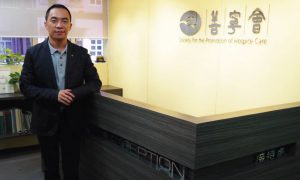Organ donation opt-out scheme may save lives
- 2016-01-09
by Alvin Kor
Nineteen-year-old Jamella Mangali Lo needed a double lung transplan.
She didn't get it. In October, she passed away after two anxious weeks of waiting.
Since her death, the Hong Kong government announced it will resume the debate on making all citizens potential organ donors unless they explicitly state their objections.
But experts doubt whether the so-called "opt-out scheme" can be implemented in a society dominated by traditional beliefs about life and death.
The number of voluntary organ donors in Hong Kong is not keeping up with the rising demand for organs.
Nearly 3,000 people are currently waiting for transplants, according to government figures.
Although Hong Kong has seen an overall increase in organ donation, from about 4.2 donors per million people in 2005 to about 5.4 in 2015, the figures lag behind those in other developed societies.
The United States has 27 organ donors per million people while Spain has 36.
Secretary for Food and Health, Dr Ko Wing-man said the government will discuss the possibility of an optout scheme to boost the city's donation rate.
Under the scheme, all Hong Kong residents will be put onto the donors list unless they submit an objection letter.
Spain, the first country to adopt the opt-out organ donation system, has the world's highest donation rate.
There are organ donation coordinators at every hospital. They counsel the patients and their families, and help
facilitate their communication with medical workers.
This successful "Spanish model" has prompted other countries, including the United Kingdom, to discuss the possibility of having a similar system. Twenty-four European countries have adopted opt-out schemes.
But it is questionnable whether a majority of Hong Kongers can accept the idea of giving away organs after
death.
Yip Chun-hin, a 22-year-old university student, thought that this practice could be difficult to implement, because according to traditional Chinese beliefs, organ removal amount sot desecration of the dead.
The belief is that the body needs to be buried whole and intact in order to bring peace to the deceased.
Mr Yip said grieving family members are unlikely to give consent to organ donation even if the patient is
registered as an organ donor.
Dr Desmond Yap Yat-hin, council member of the Hong Kong Society of Nephrology, said a lot of preparation needs to be done before such policy can be implemented.

Dr Yap said the government should allocate more resources to public education and the training of frontline doctors and transplant coordinators.
He said doctors should be told how to identify potential donors and communicate with famliy members.
President of the Society for Life and Death Education, Pasu Ng Kwai-lun agrees that Hong Kong should put
more resources on education and training.
"Public education is the key to change the concept of organ donation," Mr Ng said. "Hong Kong is a democratic city. If the government implements such policy without seeking the consent of the public, it could create backlash against organ donation."
Despite the concerns, some welcome the new scheme, hoping it will bring more people into the group of organ
donors.
"This new system would turn organ donation into a civic responsibility and allow more citizens to learn about organ donation," said Kwan Kam-fan, council member of Will In Action, an non-governmental organisation that
promotes organ donation.
Mr Kwan said the opt-out scheme, under which every patient who is pronounced brain death is screened for organ donation, will make it much easier for those who need organ transplation to find their matches.
But Mr Kwan agrees that the implementation should be accompanied by more support from the authority.
Mr Kwan said Hong Kong has only nine organ transplant coordinators across all the public hospitals, and they do
not have time to talk with all potential donors.
The Department of Health said in an email to The Young Reporter that they would ensure the new proposals are acceptable to the public before any decisions are made, and a fair and transparent mechanism will be developed.
They will continue to discuss the matter with the professional sectors and parties concerned.
(Edited by Hilary Wu)
《The Young Reporter》
The Young Reporter (TYR) started as a newspaper in 1969. Today, it is published across multiple media platforms and updated constantly to bring the latest news and analyses to its readers.

Supervision, education needed to reduce stray cat numbers

Controversies behind ambitious Lantau plan




Comments